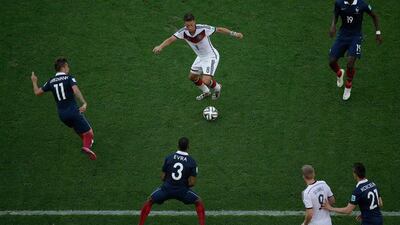Last September, at the club that employs more members of the Brazil World Cup squad than any other, the manager, Jose Mourinho, made an observation that seems particularly relevant to Tuesday’s semi-final between a Brazil stripped of important manpower and a Germany with a comfortable array of selection dilemmas.
Mourinho, who engaged in a candid and open discussion about why he had left Spain’s Juan Mata on the Chelsea substitutes bench, was championing Oscar, his attacking midfielder.
“Oscar is my No 10,” Mourinho said, talking not of jersey numbers but of the creative, central role behind a striker, “because he plays in that position for the country, Brazil, with more talented players there than anywhere in the world”.
Click here to visit The National’s World Cup 2014 landing page
The argument was reasonable enough, historically, but to revisit it 11 months on is to wonder if it is a little shallow.
Brazil head coach, Luiz Felipe Scolari – who has always given Neymar, who wears the fabled 10 for Brazil, far more licence to dictate play than he has Oscar – has spent the past four days scrabbling around to find a second-best choice for the space between midfield and the front line of attack in the absence of the injured Neymar. Scolari would be forgiven for thinking that, in 2014, there is at least one other country with more talented players for that role than his own.
Germany, for instance.
Were they to lose their leading scorer in the tournament so far, as Brazil have because of Neymar’s fractured vertebra, their crisis would not compare in depth.
Thomas Muller, with his clever, tireless running into the channels, the flanks and between the opposition defensive lines, and his four goals in five matches, would be missed, yet Joachim Loew, the Germany head coach, would be consoled by the knowledge he could ask, say, Mario Gotze to perform some of the same tasks.
If he wanted a little more sheer speed, Loew could call on Andre Schurrle, who Mourinho sometimes prefers at Chelsea, when a match needs winning, late on, to the likes of his Brazilians, Oscar and Willian. A Germany without Muller would also still have Mesut Ozil, perhaps the most classical No 10 in Loew’s first XI, to provide moments of inspiration and, even if Germany were to be without Ozil, they would still be in a pretty good place.
If they wanted somebody to attack from the left wing, where Ozil likes to roam for his national team, they could always use Lukas Podolski, who has 47 international goals from his 116 caps.
Loew lost Marco Reus, the Borussia Dortmund player, to injury before the tournament, which was a blow. Nobody registered more assists in the Bundesliga last season – 14 – than Reus, who also scored 16 league goals.
Loew looked at the absence, counted up the possible understudies and breathed easily. There was hardly an assists-deficit to address as, between them, Muller and Gotze set up 20 league goals – 10 each for Bayern Munich in 2013/14.
Meanwhile, Julian Draxler, the highly rated Schalke creator, has yet to appear at this World Cup. He can afford to be patient and will have to learn to be.
He is 20, so could still have three or four such tournaments ahead of him, although he would be wise to heed the examples set by more senior figures, such as Podolski and Bastian Schweinsteiger.
They have shown that to keep a place in the Germany hierarchy, a player must sometimes have to adapt his game because the competition for certain spots is so intense.
Podolski used to be primarily a penalty-box predator, but with so many other players who cannot only finish but do so much creative work outside that zone, he has made himself a more assured crosser with that powerful left foot.
Schweinsteiger won his first caps for Germany as a winger but now commands the centre of midfield and has developed an eye for the measured through-ball and a tenacity in the tackle.
Toni Kroos, 23, made his top-level breakthrough on loan at Bayer Leverskusen, with his creative work wide of the left of midfield. He has broader licence now, for Bayern, and for Germany.
He calls himself a “No 10”.
Most of the many, leading European clubs who covet Kroos – his contract talks with Bayern have stuttered often enough to alert suitors – would happily give him that jersey.
Among the German supporters in Brazil wearing replica shirts, you see a fair spread of No 10s, but they do not monopolise the marketplace like Brazilian 10s.
Partly that is to do with history.
Pele wore 10. So did Zico, Ronaldinho and Rivaldo.
Neymar, who is by far the most magical player of his generation, wears it.
As for the nation with the most talented No 10s in football, Mourinho might have to revise that opinion.
Germany has an abundance and half a dozen of them would command a place in almost any other national side.
sports@thenational.ae
Follow us on Twitter @SprtNationalUAE


